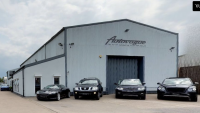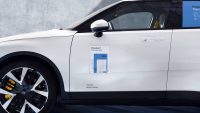HAVING plants in both the UK and on the continent will be a major bonus for the enlarged PSA Group in the case of a ‘hard Brexit’, according to its executive vice-president for Europe.
Maxime Picat, pictured above, said the agreement reached between PSA, the owner of Peugeot, Citroen and DS Automobiles, with General Motors to buy Vauxhall and Opel offered new opportunities in what was an unpredictable time for businesses around Europe.
In a wide-ranging and open interview at the Geneva Motor Show, Picat also revealed that PSA planned to sell Vauxhalls alongside Peugeots and Citroens in European dealers and hadn’t ruled out killing the Vauxhall name off completely.
If the £1.9bn deal is to go ahead, Picat believes it will be able to build a ‘European champion’, and PSA cars could even be built at Vauxhall’s Luton or Ellesmere Port plants.
He said: ‘If we get a soft Brexit, nice. We could be OK and production costs in euros will allow us to make a decent margin and we’ll be fine. If the Brexit is harder, maybe to have plants in the UK will be an opportunity because we will still be able to produce Opel Vauxhall cars, but maybe we can introduce a Peugeot or Citroen if it makes sense.’
Information from the PSA boss today revealed that the intention was to run the newly acquired car companies alongside its existing brands. Vauxhall and Opel will continue to run as currently operated, as Picat explained that ‘from today we will have a status quo’, and he assured us that ‘we will keep to all of the agreements we have signed’.
When asked if there would be job losses, Picat did not believe there would be but the idea of closing plants was still very much on the table. He said: ‘Honestly, I don’t think so. There are a lot of questions about R&D and manufacturing.
‘We know that Opel Vauxhall has already closed a plant, we did the same in France, but now the European market has recovered a lot. The situation has improved and still making plants more efficient is key.’
With brand loyalty strong for the manufacturers in different regions, the intention is to keep the same names for the foreseeable future, although the ex-boss of Peugeot warned that this could change. He said: ‘For now, we will keep the same names. In the future, we will see.’
He also confirmed that Vauxhall and Opel will produce the current range of cars in their existing form. However, when these are renewed the models will move on to PSA platforms. What this will mean for UK factories in the long run is unknown, but it offers hope in the short term.
Picat explained that the relationship was attractive to PSA because it was confident in the synergies between the car makers, stating: ‘This last year Vauxhall Opel produced competitive cars. We had Astra as Car of the Year. That, from my external point of view, has a clear positioning and everything else that we are going to build is about having a European champion, having a portfolio of brands that are very well positioned with very limited cross-shopping. The cross-shopping depending on the countries is very low, between three and five per cent.’
For PSA today, though, this relationship and the increase in market share to 17 per cent in Europe means that it really is ‘back from the dead’.
Picat said: ‘I’ve already had feedback from people who say “Wow, Peugeot is really back in the race.”
‘There is a sense of pride within our organisation and it gives a strong signal. Even if you are almost dead, if you’ve got the will and good management and have the chance to have [PSA managing board chairman] Carlos Tavares, you can change the game in a very short period of time.’
He added: ‘That’s a very positive message and one that we want to send to the people of Vauxhall. After years of loss, there is a way. Your situation today is not far from our situation two to four years ago. There is a way out of the situation.’
Picat said he wasn’t worried about any clash between the product line-ups and explained that the plan now was to make Vauxhall and Opel profitable by 2020. The collaboration will also offer more possibilities for the PSA Group both in Europe and globally.
‘By being together on the sales and marketing area, tomorrow I can propose to a French dealership to open an Opel dealership,’ he said. ‘They would be happy to develop their business. They would be reassured because now they know it’s within our area and it’s the same thing in Germany, for example. We are small in Germany and maybe I can use the Opel network to develop more Citroen and Peugeot dealerships and we can help one another.’
He added that the deal offered more far-reaching opportunities too. ‘Vauxhall Opel offers us an opportunity to grow outside of Europe. Definitely, we have plans to grow in Ireland, in India, in China, South America and even North America. The world is open to us and we need to grow there to balance our footprint.’
MORE: £1.9bn deal will see GM sell Vauxhall and Opel to PSA Group
MORE: Union chief McCluskey tells of ‘relatively positive’ talks over Vauxhall
MORE: Prime minister and PSA boss discuss ‘shared goals’ over future of Vauxhall
MORE: GM ‘wants to offload Vauxhall before the Geneva Motor Show in March’
On SuperUnleaded.com: Here’s Our Top 10 From The Geneva Motor Show





































